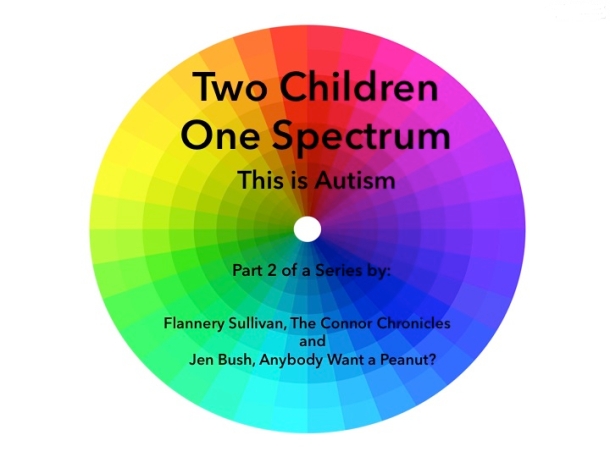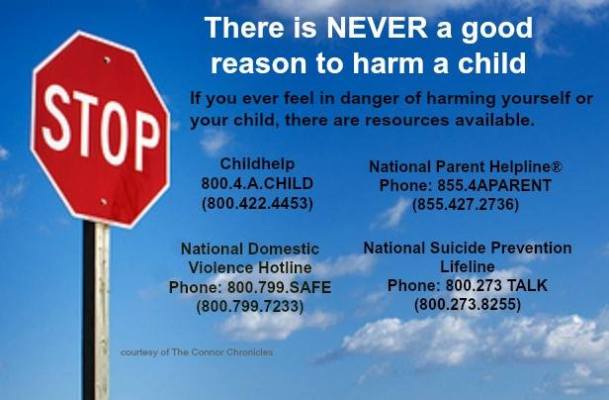If you missed my last post, this is a new series about two children on the autism spectrum. Jen, from Anybody Want a Peanut, will be writing about her son, Moe, and I will write about Connor as we explore similarities and differences in several categories. We hope to show people how very different two people with the same label can be, and how important it is for services and supports to be individualized.
First, let’s start with an introduction of our boys:
Moe:
My son Moe is seven. He has a diagnosis of Autism Spectrum Disorder (ASD). He is severely affected. He does not have any other official diagnoses, although certainly apraxia of speech and Sensory Processing Disorder would be on the list. He has global intellectual delays.
The only way I can describe Moe is he is an atypical autistic kid. He is very challenging to teach and standard methods for working with autistic kids typically do not work for him. He is a sweet, funny, mischievous kid who also has a lot of challenging behaviors.
Connor:
Connor was diagnosed with severe ADHD and Asperger’s when he was three. He is now nine-years-old and, since the changes to the DSM, he now falls under the catch-all diagnostic category of autism.
We knew Connor was different as early as a few months old because of difficulty with sleeping and excessive motor activity. Before his diagnosis we often joked about ADHD because we were almost certain he had it. The Asperger’s diagnosis was a bit of a surprise to us, because he didn’t exhibit the “typical” autistic behaviors of flapping, lining up toys, toe-walking, or lack of social engagement. But there were other red flags, such as not pointing or waving until he was almost two, having meltdowns over seemingly trivial issues, scripting of lines from television shows, and rigidity about various routines.
Now for the main topic of the post, communication:
Moe:
Moe is completely non-verbal. I do not mean he has a few words, or that his language is scripted or echolalic. He has no words. He can make the sounds “ba,” “ma” and sometimes “pa” or “ah-pa” when asking for things. Moe is physically capable of making other sounds, but he does not put them together in a way that is meaningful for communication. After several years with a fantastic private speech therapist, but with little progress and increasing behaviors in therapy, the SLP was no longer able to work with us.
Moe mostly communicates through pointing and hand leading. He knows a few signs, but tends to fall back on one catch-all sign that roughly translates to “help-open-more-want.” He can imitate signs when modeled. We tried an iPad app (LAMP Words for Life) for a while, but we have recently gone back to using a photo-based PECs system.
Moe has some receptive language and understands simple requests. He likely understands much more than we realize.
Connor:
There’s not a day that goes by where I’m not profoundly grateful that Connor communicates so well, especially when so many of my friends would give anything to hear the sound of their child’s voice. There is another side to the communication coin, however, and that’s when your child NEVER STOPS communicating. Questions, questions, more questions, thinly-veiled debate, intense negotiations, all day, every day, from the time he wakes up to the time he goes to bed at night, that is my child. The most pressing questions seem to always coincide with my need to use the restroom. Every. Single. Time. I’ve had phone conversations with friends who ask, at the end of the call, whether it’s “always like that.” What they want to know is whether Connor is always so constantly in need of my attention and interaction. Yes. Yes, it’s always like that. But as much as it can chip away at my sanity sometimes, there will always be the part of me that sends up a silent little word of thanks to the universe that he can talk, that he WANTS to talk, to me.
That doesn’t mean that communication has come easily. I remember vividly when he was younger, and I would ask him for some privacy. He would always look so confused before he began hammering me with questions. “Where is the privacy? I’ll go get it and bring it to you.” He couldn’t understand that privacy was a concept, an idea, not an actual thing you could hand over to someone, like a box with a giant red bow on top. Although he’s mastered the idea of privacy now, and actually requests it for himself, we still run into similar issues with other figures of speech. It’s taught us a new way to think before we speak, considering whether our words could have other meanings.
Summary:
Although we’ve only just covered the first topic, you’re undoubtedly getting a sense of the differences between our boys. Each has their own particular strengths, challenges, and needs. Each one autistic, yet one has almost no language while the other is a landslide of constant communication. I can’t help but imagine how different our parenting experiences have been as we’ve worked to support and help our children to the best of our abilities.
The next post in this series will run on Thursday, December 4th, and will cover the topic of feeding issues.
Also, Jen and I encourage you to write along with us! If you’d like to write about your child in each category, please leave a comment to this post with a link to your post/page.









